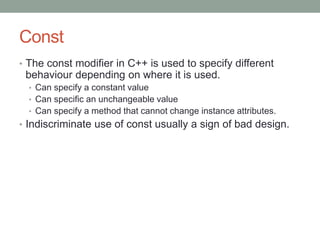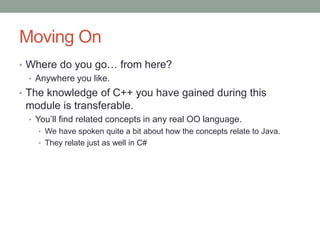2CPP19 - Summation
- 2. Introduction • We have reached the end of our journey through object orientation in C++ • Huzzah, hooray, etc, etc • As the last lecture on the topic, we are going to recap on all the significant theoretical concepts. • Not rehash, just recap. • This knowledge will Guide You Well when it comes to the exam. • These are things you are expected to know!
- 3. The Principles of OO • OO is based primarily on three key principles. • Inheritance • Encapsulation • Polymorphism. • Together they form a mighty triad of techniques for building genuinely powerful programs. • These three together is why it is a fundamentally different style from structured programming.
- 4. The Principles of OO • Object oriented structures are not inherently scalable. • You need to be careful with what you do. • Metrics such as coupling and cohesion give a view of the objective quality of a class hierarchy. • Methods such as impact of change give a view of the maintainability of a system.
- 5. Why OO? • Why do we code using objects? • Easier for humans to understand? • No. • More efficient? • No • More maintainable • Yes • More expandable • Yes • Reusable • Kinda • Powerful? • Very much so.
- 6. Inheritance • The process of inheritance is to assume the methods and attributes of another class. • Modified by the visibility of those methods and parameters. • Java permits single inheritance only. • As does C# • C++ permits multiple inheritance. • There be dragons. • Only one genuinely good thing comes from multiple inheritance in C++
- 7. Encapsulation • Encapsulation is the process of bundling the attributes of a class along with the methods that act upon those attributes. • Goes hand in hand with the topic of information hiding. • Should ensure a separation of abstraction and implementation. • Access to functionality available only through predefined interfaces.
- 8. Polymorphism • The most abstract of the three. • It’s the technique of treating a specialised class as an instance of a more general class. • Significant differences between C++ and Java here. • All methods in java are inherently virtual. • In C++, method virtuality must be declared as part of the class definition. • Only virtual methods will be called as the most specialised version.
- 9. Overloading and Overriding • Object orientation is about providing a consistent interface to an object. • There are various techniques that allow us to do this. • Three key ways in which this is done in C++ • Method overloading • Method overriding • Operator overloading • The last is not available in Java • Which is a good thing.
- 10. Method Overloading • Process used to permit multiple interfaces to a single method. • Don’t need to learn two sets of methods • One method with two sets of parameters. • Reduces the cognitive burden on using an object. • Ensures consistency across an interface. • Can be overdone.
- 11. Method Overriding • Method Overriding is the process of providing a specialised implementation of a single method. • Incorporated strongly into polymorphism and inheritance. • Works through the use of virtual methods in C++ • In Java, all methods are implicitly virtual.
- 12. Operator Overloading • C++ permits for operators to be overloaded. • Change the way the basic + and – operators work on objects. • Leads easily to code obfuscation. • Need to understand not only the objects, but how and where they can be applied to base operators. • Handled using overridden methods in Java. • A more elegant approach for a more civilized age.
- 13. Abstraction • Abstraction is a key element in programming. • It’s the process of getting rid of the low level details to focus on the high level interactions. • Is both conceptual and technical as a term. • Abstraction is a general process • Abstract classes are a specific kind of abstraction in object oriented programs. • Understanding the flow of execution through a class hierarchy requires understanding of abstraction.
- 14. Abstract Classes • Abstract classes cannot be instantiated. • They can only serve as the basis for other derived classes. • They can enforce a polymorphic contract with the compiler. • A class in Java is made abstract via a special keyword. • A class in C++ is made abstract by the inclusion of a pure virtual method
- 15. Pure Virtual Methods • A virtual method in C++ may be over-riden if the developer desires. • A pure virtual method must be over-ridden. • Classes which incorporate no code and only pure virtual methods can be used as interfaces. • Java has a special keyword for this too. • Only good use of multiple inheritance.
- 16. Templates • Abstraction as a concept leads into the concrete implementation of templates. • Boilerplate code • Code is generated by the compiler based on typing information. • Templates are a powerful tool • Used to good effect in the Standard Template Library. • A library of C++ classes for everyone to use.
- 17. STL • The Standard Template Library contains implementations of: • Sequential containers • Adapter containers • Associative containers • Worthwhile exercise to write these structures from scratch. • Understanding gained by doing this. • Worth using the STL structures for ‘live’ code.
- 18. Stream Based I/O • I/O in C++ based primarily on streams. • Polymorphism allows for the same basic operators to work on file and keyboard/monitor I/O • I/O operations quite flexible. • You can modify the presentation quite a bit. • However, object representation in files remains complex. • Serialization is the process used, and not natively supported in C++.
- 19. Static • Static methods in object oriented languages are class methods. • They belong to a class, not to an instance. • Static attributes in object oriented languages are class attributes. • All objects share the same data field for this. • Static methods are limited. • Can only call on other static methods or attributes.
- 20. Const • The const modifier in C++ is used to specify different behaviour depending on where it is used. • Can specify a constant value • Can specific an unchangeable value • Can specify a method that cannot change instance attributes. • Indiscriminate use of const usually a sign of bad design.
- 21. Moving On • Where do you go… from here? • Anywhere you like. • The knowledge of C++ you have gained during this module is transferable. • You’ll find related concepts in any real OO language. • We have spoken quite a bit about how the concepts relate to Java. • They relate just as well in C#
- 22. But… why? • All of these concepts are complicated by the nature of pointers. • Pointers are the secret engine behind C++ • C++ is a complicated language because it layers pointer troubles on top of conceptual troubles. • Why do this module in C++? • Several reasons.
- 23. C++ in Industry • C++ remains one of the most popular languages in industry. • It’s not the most popular, but you’ll encounter it often in Real Life. • People who can code in C++ or C are a dying breed. • ‘Too complicated’ • However, you learn things in C++ you don’t in other languages.
- 24. C++ The Language • Even if you never create another pointer, simply understanding how they work opens up a world that other languages hide. • C++ more than any other language requires you to understand the implications of what you are doing. • This is an important mental skill. • It’s not just about the code. • It’s about the concepts.
- 25. Memory Management • C++ has explicit memory management. • No inherent, automated • garbage collection as in Java • We must manually handler pointers and dynamic memory ourselves. • This has implications for our design. • Copy constructors • Overloaded assignment operators • Destructors • Learning to do this is a good mental exercise. • Albeit frustrating.
- 26. Next Week • Next week is your consolidation week. • Use the time wisely, young padawans. Padawen? Padawii? • The lab will be staffed as always. • Only two contact hours for the scheduled lecture time. • Lab prep on Monday. • Q&A about your current assessment. • Bring questions about the assessment if you have any. • Drop in tutorial on Thursday • Come along if you have any questions relating to OO concepts. • No planned content otherwise.
- 27. Summary • Our discussion of OO in C++ is at an end. • Alas, alas • Next week is the consolidation week. • Finish up what you’re working with. • The week after you’ll be learning about data structures with Manuel. • These build on the concepts we have discussed over the past few weeks. • Have fun! • Snausages.



























